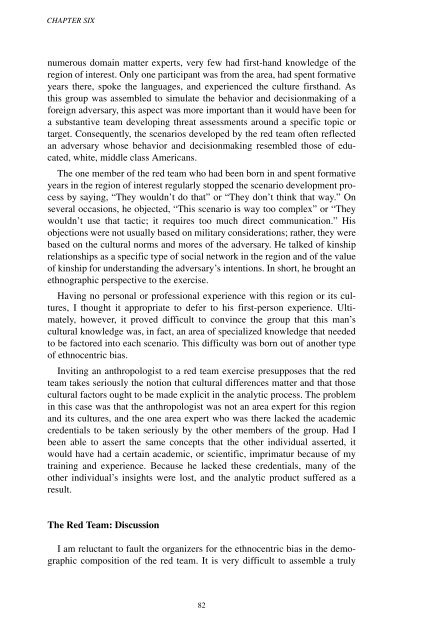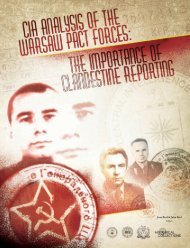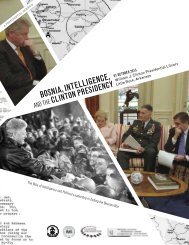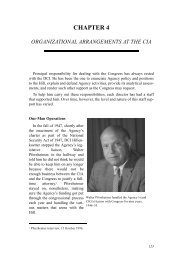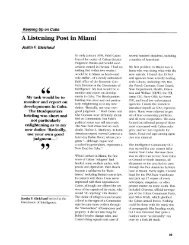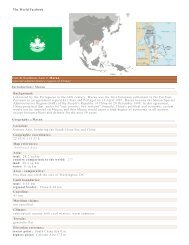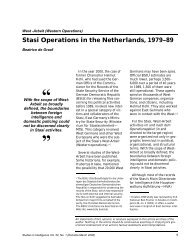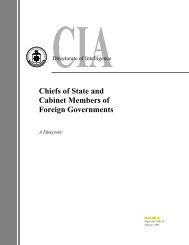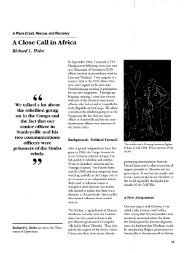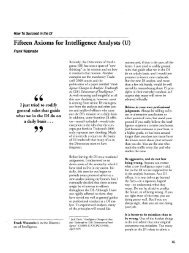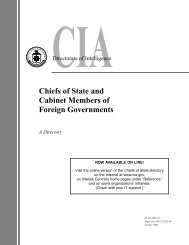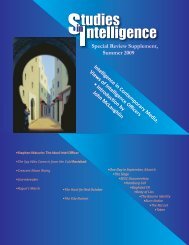Analytic Culture in the U.S. Intelligence Community (PDF) - CIA
Analytic Culture in the U.S. Intelligence Community (PDF) - CIA
Analytic Culture in the U.S. Intelligence Community (PDF) - CIA
You also want an ePaper? Increase the reach of your titles
YUMPU automatically turns print PDFs into web optimized ePapers that Google loves.
CHAPTER SIX<br />
numerous doma<strong>in</strong> matter experts, very few had first-hand knowledge of <strong>the</strong><br />
region of <strong>in</strong>terest. Only one participant was from <strong>the</strong> area, had spent formative<br />
years <strong>the</strong>re, spoke <strong>the</strong> languages, and experienced <strong>the</strong> culture firsthand. As<br />
this group was assembled to simulate <strong>the</strong> behavior and decisionmak<strong>in</strong>g of a<br />
foreign adversary, this aspect was more important than it would have been for<br />
a substantive team develop<strong>in</strong>g threat assessments around a specific topic or<br />
target. Consequently, <strong>the</strong> scenarios developed by <strong>the</strong> red team often reflected<br />
an adversary whose behavior and decisionmak<strong>in</strong>g resembled those of educated,<br />
white, middle class Americans.<br />
The one member of <strong>the</strong> red team who had been born <strong>in</strong> and spent formative<br />
years <strong>in</strong> <strong>the</strong> region of <strong>in</strong>terest regularly stopped <strong>the</strong> scenario development process<br />
by say<strong>in</strong>g, “They wouldn’t do that” or “They don’t th<strong>in</strong>k that way.” On<br />
several occasions, he objected, “This scenario is way too complex” or “They<br />
wouldn’t use that tactic; it requires too much direct communication.” His<br />
objections were not usually based on military considerations; ra<strong>the</strong>r, <strong>the</strong>y were<br />
based on <strong>the</strong> cultural norms and mores of <strong>the</strong> adversary. He talked of k<strong>in</strong>ship<br />
relationships as a specific type of social network <strong>in</strong> <strong>the</strong> region and of <strong>the</strong> value<br />
of k<strong>in</strong>ship for understand<strong>in</strong>g <strong>the</strong> adversary’s <strong>in</strong>tentions. In short, he brought an<br />
ethnographic perspective to <strong>the</strong> exercise.<br />
Hav<strong>in</strong>g no personal or professional experience with this region or its cultures,<br />
I thought it appropriate to defer to his first-person experience. Ultimately,<br />
however, it proved difficult to conv<strong>in</strong>ce <strong>the</strong> group that this man’s<br />
cultural knowledge was, <strong>in</strong> fact, an area of specialized knowledge that needed<br />
to be factored <strong>in</strong>to each scenario. This difficulty was born out of ano<strong>the</strong>r type<br />
of ethnocentric bias.<br />
Invit<strong>in</strong>g an anthropologist to a red team exercise presupposes that <strong>the</strong> red<br />
team takes seriously <strong>the</strong> notion that cultural differences matter and that those<br />
cultural factors ought to be made explicit <strong>in</strong> <strong>the</strong> analytic process. The problem<br />
<strong>in</strong> this case was that <strong>the</strong> anthropologist was not an area expert for this region<br />
and its cultures, and <strong>the</strong> one area expert who was <strong>the</strong>re lacked <strong>the</strong> academic<br />
credentials to be taken seriously by <strong>the</strong> o<strong>the</strong>r members of <strong>the</strong> group. Had I<br />
been able to assert <strong>the</strong> same concepts that <strong>the</strong> o<strong>the</strong>r <strong>in</strong>dividual asserted, it<br />
would have had a certa<strong>in</strong> academic, or scientific, imprimatur because of my<br />
tra<strong>in</strong><strong>in</strong>g and experience. Because he lacked <strong>the</strong>se credentials, many of <strong>the</strong><br />
o<strong>the</strong>r <strong>in</strong>dividual’s <strong>in</strong>sights were lost, and <strong>the</strong> analytic product suffered as a<br />
result.<br />
The Red Team: Discussion<br />
I am reluctant to fault <strong>the</strong> organizers for <strong>the</strong> ethnocentric bias <strong>in</strong> <strong>the</strong> demographic<br />
composition of <strong>the</strong> red team. It is very difficult to assemble a truly<br />
82


